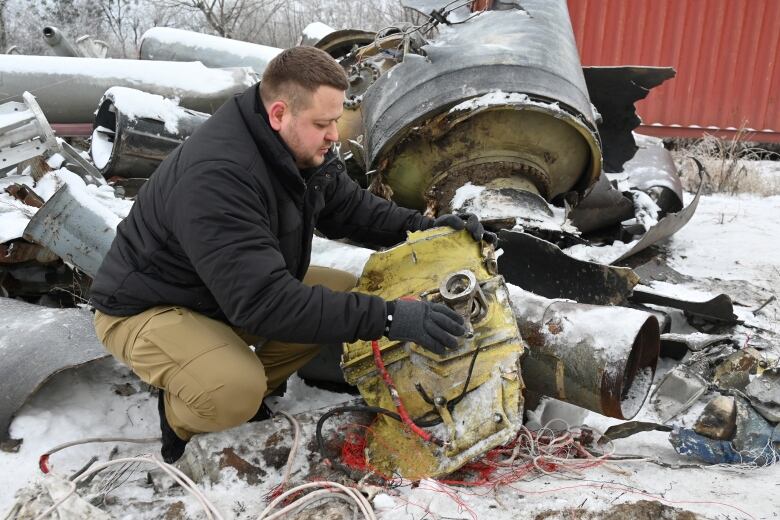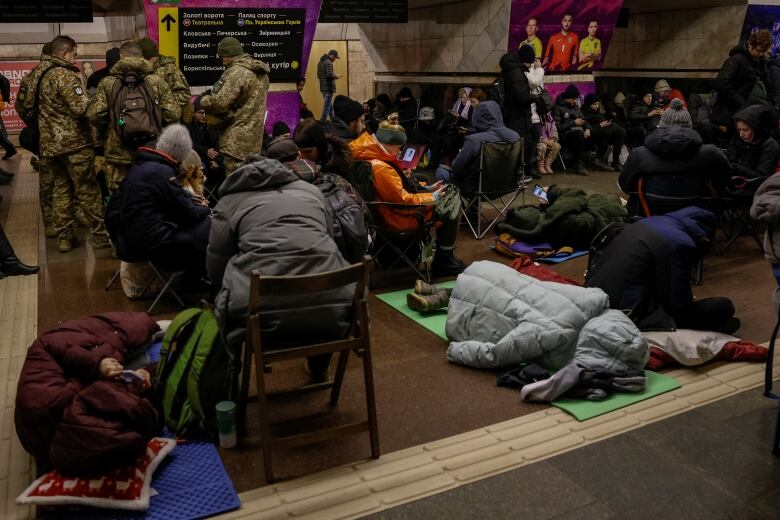Ukraine air force official warns defences from Russian missiles are stretched thin
Russia fired more than 500 drones and missiles between Dec. 29 and Jan. 2, Ukraine officials say

Russia's recent escalation of missile and drone attacks is stretching Ukraine's air defence resources, a Ukrainian air force official said Tuesday, leaving the country vulnerable in the 22-month war unless it can secure further weapons supplies.
"Intense Russian air attacks force us to use a corresponding amount of air defence means," air force spokeperson Yurii Ihnat told national television. "That's why we need more of them, as Russia keeps increasing its [air] attack capabilities."
As soldiers on both sides fight from largely static positions along the roughly 1,500-kilometre front line, recent Russian attacks have used large numbers of various types of missiles in an apparent effort to saturate air defence systems and find gaps in Ukraine's defences.
The massive barrages more than 500 drones and missiles were fired between Dec. 29 and Jan. 2, according to officials in Kyiv are also using up Ukraine's weapons stockpiles.

Ukraine uses weapons from the Soviet era and more modern ones provided by its Western allies. Authorities want to build up the country's own weapons manufacturing capabilities, and analysts say those plants are among Russia's recent targets.
"At the moment, we are completely dependent on the supply of guided air defence missiles, for both Soviet and Western systems," Ihnat said.
Recent barrage
President Volodymyr Zelenskyy said on Jan. 7 that "we lack a very concrete and understandable thing, that is air defence systems," to protect civilian areas and troop positions.
"We lack [air defence systems] both on the battlefield and in our cities," he told a Swedish defence conference.
Speaking at a meeting with military brass, Russian Defence Minister Sergei Shoigu declared that Kyiv's efforts to bolster its firepower "won't change the situation on the line of contact and will only drag out the military conflict."
"We retain the strategic initiative along the entire line of contact," Shoigu said. "We will consistently continue to achieve the objectives of the special military operation" the Kremlin's language for the war in Ukraine.
It was not possible to verify either side's battlefield claims.
The Kremlin's forces show no signs of easing off their winter campaign. In what officials called the biggest aerial barrage of the war, Russia launched 122 missiles and dozens of drones on Dec. 29, killing 62 civilians across the country. On Jan. 1, Russia launched a record 90 Shahed-type drones across Ukraine.
'No comment' on North Korean imports
Russia has expanded its own production of missiles and drones, analysts say, and has begun using short-range missiles provided by North Korea.
The Kremlin declined on Tuesday to comment on U.S. and Ukrainian assertions that Moscow had fired North Korean missiles at Ukrainian targets.

Both Moscow and Pyongyang have drawn closer since the beginning of the Ukraine conflict, though they deny making any arms deals. North Korean leader Kim Jong Un met President Vladimir Putin in Russia's Far East region last September and senior Russian officials have made several visits to Pyongyang.
Asked about the U.S. and Ukrainian accusations during a call with reporters, Kremlin spokesperson Dmitry Peskov said: "No comment."
Peskov added that Ukraine had repeatedly struck civilian targets inside Russia using missiles produced by "Germany, France, Italy, the United States, and other countries."
Russian air defence capabilities also questioned
Ukrainian officials have pleaded with the West for more weapons, especially air defence and artillery shells.
However, a plan by the administration of U.S. President Joe Biden to send to Kyiv billions of dollars in further aid is stuck in Congress, and Europe's pledge in March to provide onemillion artillery shells within 12 months has come up short, with only about 300,000 delivered so far.
U.S.-made surface-to-air Patriot missiles give Ukraine an effective shield against Russian airstrikes, but the cost is up to $4 million US per missile and the launchers cost about $10 million each, analysts say.
Such costly support is "essential" for Ukraine, a U.S. think-tank said.
"The continued and increased Western provision of air defence systems and missiles to Ukraine is crucial as Russian forces continue to experiment with new ways to penetrate Ukrainian air defences," the Institute for the Study of War said.
Ukraine, meanwhile, has increasingly targeted Moscow-occupied Crimea and Russian border regions with long-range strikes.
In the latest strike, two drones fell on the premises of a fuel and energy facility Tuesday in the Russian city of Orlov, about 250 kilometres from the Ukraine border, Gov. Andrei Klychkov said.
Three people were injured and a fire broke out but was quickly extinguished, Klychkov said.
The U.K. Defence Ministry pointed to repeated signs of shortcomings in Russia's air defences. Ukrainian strikes on military targets in Crimea on Jan. 4 demonstrate "the ineffectiveness of Russian air defences in protecting key locations," it noted Tuesday.













_(720p).jpg)


 OFFICIAL HD MUSIC VIDEO.jpg)
.jpg)



























































































